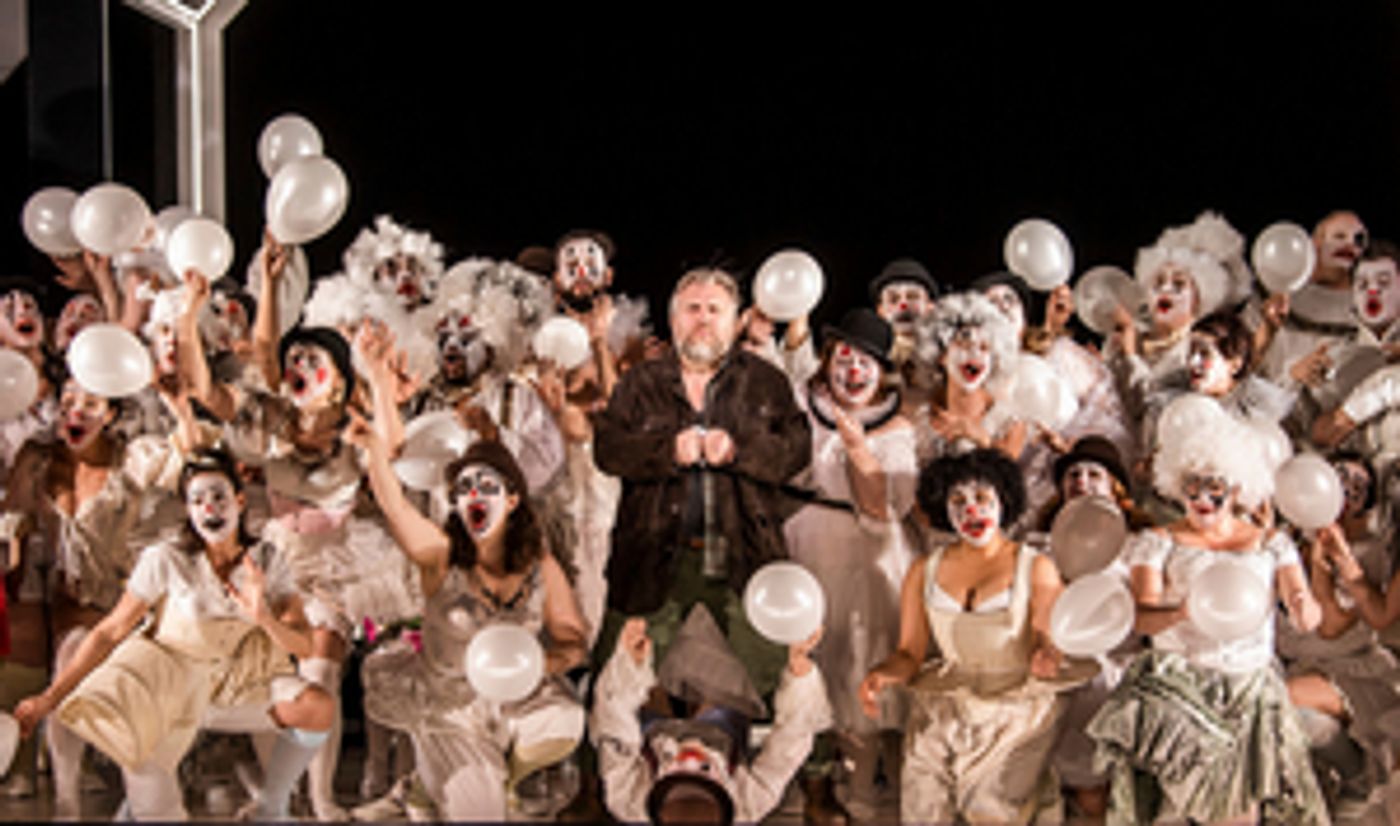Review: LUISA MILLER, London Coliseum

![]() There must have been a two-for-one offer on the day director Barbora Horakova visited the Regietheater prop store to kit out her Luisa Miller for English National Opera.
There must have been a two-for-one offer on the day director Barbora Horakova visited the Regietheater prop store to kit out her Luisa Miller for English National Opera.
White walls and plenty of black marker pens to daub on them; geometric structures; sinister clowns; a chorus all costumed somewhere between circus freak and sexy-Bedlam; a quartet of contemporary dancers scraping and draping themselves across the set: we got them all in this hectic, wilful, defiantly joyless staging of Verdi's tragedy of love across the class divide.
Sitting just before the composer's "popular trilogy" of Rigoletto, La traviata and Il Trovatore, Luisa Miller is tantalisingly close to mature Verdi. You can hear all the elements, see all the themes to come, but they're still trapped in unwieldy, fixed musical forms, only breaking out into something like freedom in the fluid sequence of duets that make up the final Act.
The opera (a loose adaptation of Schiller's Kabale und Liebe) makes no apology for its melodrama. Sinister villain Wurm (the name says it all) and tyrannical father Walter make quite the boo-hiss pair, not afraid of a little light kidnap and torture, and a healthy dose of poison spices up the finale.
But it's not all darkness. In fact, the piece lives in contrasts. The brooding court scenes are balanced by the bucolic sweetness of Luisa's village life, Walter's manipulative relationship with his son set against the tender respect between Miller and his daughter, aristocratic machinations jostle up against peasant simplicity.
It's a simple structure, but one that gives us an arc, tension. The problem with Horakova's unremitting bleakness is that we have nothing to play for, no one to root for. Gone are the Millers' simplicity (he's a pill-popping neurotic uncomfortably fond of his little girl, while she's a good-time girl with daddy issues); gone is anything like love between Luisa and Rodolfo, whose embraces are the desperate clinging of trauma survivors. The question isn't will they or won't the make it, but how long it'll take us to get from despair to death.
And then there's the question of class. Luisa Miller pivots on a father's social ambition, which leads him to terrible lengths to secure the right kind of wife for his son. Here, in this wipe-clean, monochrome world, any question of difference is dissolved into moody abstraction. Perhaps that's the point - the arbitrary nature of such distinctions - but it leaves this murderous drama in search of a motive.
But behind all this conceptual fuss, a rather exciting account of Verdi's score is struggling to get out. From the first nervy bars of the Overture we feel the energy and focus from Alexander Joel's pit, and this near-symphonic movement gives him a chance to let the ENO Orchestra off the leash, to revel in the unapologetic drama the director seems so ashamed to release.
British soprano Elizabeth Llewellyn returns to the company after far too long a gap in the title role. If Act I's Bel Canto Luisa is a bit of a squeeze for this generous voice, she comes into her own in the later acts, where soubrettish agility gives way to demanding, sustained vocal drama.
We get a gorgeous Act III prayer, but best of all a finale scene where concept finally falls away (though sadly the awkward English translation remains) and she and exciting young tenor David Junghoon Kim can finally do their thing without interference. Kim's "Quando le sere al placido" rings with Italianate fervour, a tease of things to come from this former Jette Parker Young Artist.
Slimy henchman Wurm gets a makeover in Soloman Howard's predatory hunk, panther-smooth both in voice and movement, and James Cresswell does the necessary as a solid Walter, with Christine Rice a luxury extra in the small role of Federica. Only Olafur Sigurdarson's Miller feels strained, flinging phrases out into the Coliseum with unnecessary force.
Luisa Millers don't come along every day; ENO's staging is London's first in 16 years. What a waste of a cast and an opportunity.
Luisa Miller at the London Coliseum until 6 March
Photo Credit: Tristram Kenton
Reader Reviews
Videos

